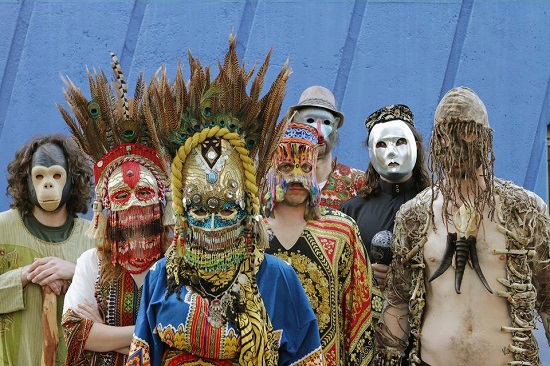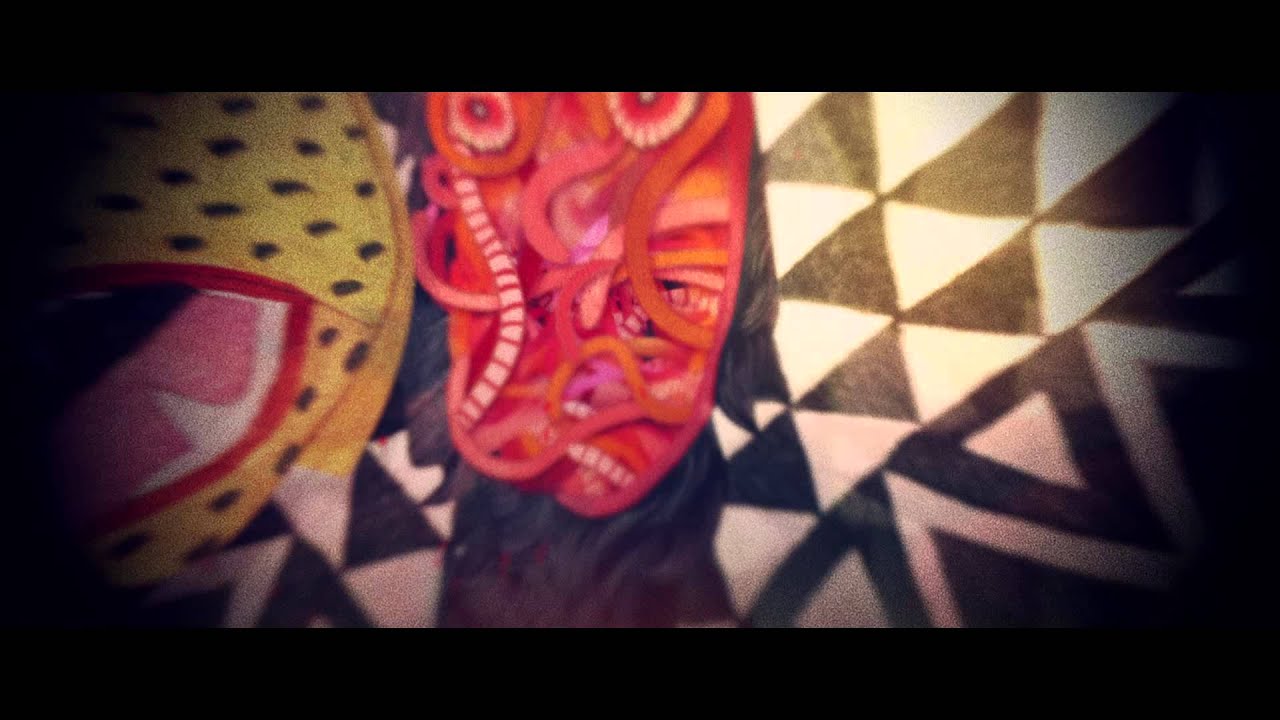Last year saw the release of the oft-mysterious Goat’s second album, Commune, a tight, confident fusion of tribal beats, psychedelic flourishes, ritualised vocals and crunchy guitars. Goat were largely unknown outside of their native Sweden until their brilliant debut album World Music started showing up on best-of lists in 2012, a start they consolidated with live shows characterised by masks, dancing and shamanic affectation. While they may be a band that have figured out how to rise above their secretive lore to make terrific rock & roll, we caught up with one anonymous member over the phone to see if we could crack the cipher of their mystique.
Did you expect World Music to score as big as it did?
Goat: I don’t think we had any expectations at all. We just tried to make rock & roll, to make music, you know? Then we were fortunate with Rocket, who released it. We thought we might sell like a thousand copies and that would be fine, we get an album to enjoy ourselves and to give away to some friends. That was what we expected. And I think Rocket expected more or less the same as well. So it was a surprise.
When did you first realise it was taking off?
G: I don’t know. Mostly because when we released the album, we went to the UK and did some shows, I think, at smaller venues. Then when we got back we did two Swedish shows and at both shows, people were lining up like way out in the streets. And we were like, what is this? But we did those two shows to finance the UK shows. And then suddenly the offers just exploded.
Can you describe the recording process of the new album, Commune?
G: We record ourselves in our own studio and we record on tapes with lousy equipment, really lousy. We record on a 16-track tape machine and we borrow mics. It’s not a high-tech studio and it’s not a high-tech recording at all. There’s no editing afterwards. We mix it from tape down to a stereo channel in the computer and we play around and then we add a lot of stuff afterwards.
So you do the productions yourselves?
G: Yeah, both albums. It sounds better I think, in many ways. The sound from some songs on this one is way better than the first one, but it’s because we have learned how to use the studio. We used it so much that our ears learnt how to mix and use the studio.
How do you come up with a track? Is it a collaborative effort?
G: Normally we jam a lot and then we end up with a lot of songs. Then we narrow it down and we just make some small arrangements on it and record it again or sometimes we just keep a jam and overdub or mute stuff. Or sometimes we just record off the words that we have arranged but sometimes it starts with a melody or a text line or whatever, and we build something around it. What we build around it is normally a jam. Then we arrange it into the piece.
What were your strongest influences on Commune?
G: We listen to a lot of music from all over the world and we are really into rhythms. We don’t think so much about it, we just do what we feel like. So if we want to do a song sounding like a jam from somewhere, we try to do that, because it’s fun, because it feels right. There’s not much thinking, not much planning or anything. Everything sounds like something else at the end; but just do what you feel like and have a good time doing it, if it comes out okay then great.
There’s a real spiritual element to your music. Is there a driving force behind this or does the music just evoke these things?
G: I think both. Making music is a spiritual process in a way. Playing it, making it, everything, creativity is a spiritual thing. At the same time, when you are aware that you are a spiritual being, then that also helps in releasing your creativity in a good way.
Why is mystery so important to you?
G: The mystery is nothing we really planned for. I understand it is mystical, but we just want to be anonymous in every way. I don’t want anyone to know anything about us. It’s more like I want to be the one I am when I’m not performing. I don’t want to be connected with this always. There are many reasons to it, but the freedom to be able to walk out after a show and have a beer and no one knows who you are is great. You can go have a smoke and no one knows who you are. It’s a lot better.
You don’t want to be a star then?
G: No, not at all. We don’t want to even be close to that. As a musician we like people to hear our music, like everyone else. We enjoy performing in front of a full house rather than an empty one, but ourselves as people don’t need any media attention or anything like that. We want to stay away from all of that. It’s better.
Do you ever feel possessed by something greater than you?
G: Hard question. I guess you can feel that the most when you jam by yourself. You really can feel that you are lifted up by something, connecting with something. While performing it’s still a soul in a way, it’s still performance, it’s still sounds being played. It’s for an audience and you can feel the energy of the room or the energy between you and the people in the band and the people of the audience. You can feel positive energy in a way. But to fully connect with something else, something more spiritual, I think it’s hard to do that on the stage.
Do you feel that you have found an authentic way to bridge the individual and the performance elements so that when you are performing it’s not contrived?
G: No, I don’t know how it could be false. People sometimes drop [those words] ‘false’ or ‘fake’. How could music ever be fake? It’s just tones, rhythms and expression, it’s just an expression. If you want to do it, just do it the way that feels right for you. It can only be fake for the person doing it.
Are you going to go right back into the studio now that you are done touring?
G: We are going to have some rest to do something: recording and playing and jamming and making music is in a way more creative than performing. We performed a lot last year. So we want to be creative again. Develop and make some music. I think you can’t plan too much, you just have to do what is right and then sometimes it has some timing and it appeals to people. People think we plan so much, we don’t plan anything at all.
Commune is out now via Rocket Recordings. Goat will be playing a four-date tour of Italy, starting at Orion Club in Rome on May 6



